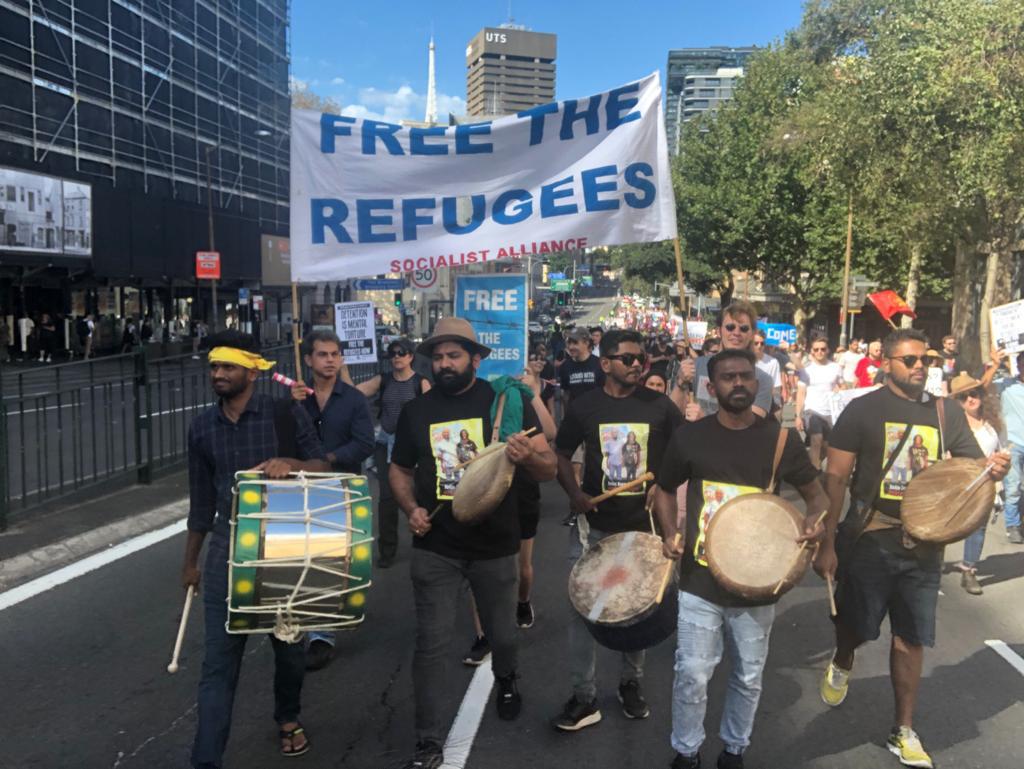Australian Tamils protest against the detention of refugees in March 2021.
As tennis player Novak Djokovic left an Australian hotel where he was being detained by immigration authorities this week, asylum seekers have hoped the incident, which has received international attention, will shed light on the conditions and system in which they remain trapped.
“I couldn’t believe that Djokovic is here,” said 24-year-old Adnan Choopani told NBC news this week, from the same detention hotel in which the tennis superstar was being held. “I hope he shares what he’s seen.” Choopani, who fled Iran, is one of the many asylum seekers at the hotel, where conditions have been labelled “disgusting”.
Maggots have been found in the food and another asylum seeker Mohammad Joy Miah said he was feeling "mentally broken".
"I have not had any fresh light or fresh air from outside. My life is a room," he told the BBC.
“I have nightmares every night,” 38-year-old Jamal Mohamed told Guardian Australia. “All I want is freedom.”
Djokovic’s detention has also drawn attention to Australia’s asylum policies, which has seen many Tamils who fled Sri Lanka, trapped and in detention.
One Tamil family of four - Priya, Nades and their two young daughters, Kopika and Tharnicaa - remain in "community detention" in Perth and have been fighting a long legal battle to remain in Australia since they were removed from their Biloela home in 2018.
In August 2021, Koneshwaran Krishnapillai, a Tamil refugee and father of three, has died after setting himself on fire, following years of uncertainty regarding his immigration status in Australia. The 38 year old, who was denied a protection visa by the Australian immigration department in 2018, "was constantly worried about being deported back to danger," according to the Tamil Refugee Council.
Australia’s continued draconian immigration policy persists despite growing recognition of the threats of torture and abuse that Tamil asylum seekers face when forcibly returned. A 2021 landmark court ruling in the UK found that a key document used by Home Affairs and tribunals in Australia to reject refugee applications for Tamils from Sri Lanka to be “unreliable”.
The Australian Department of Foreign Affairs and Trade (DFAT) 2019 country information report on Sri Lanka claims torture of Tamils is no longer state-sponsored and that there is a low risk of torture overall. However, the United Kingdom Upper Tribunal questioned its methodology and noted, "none of the sources [in the report] are identified, there is no explanation as to how the information from these sources was obtained."
The court went on to recognise that the "authoritarian and paranoid" Sri Lankan government monitors the activities of the Tamils diaspora. If an asylum seeker was returned to the country, they risk being subjected to torture, which is "endemic" in the Sri Lanka.
Regardless, Australia has continued with its draconian policies.
Just last month, the Australian government came under criticism after the launch of a website that includes video games and a film competition, supposedly to deter asylum seekers from Sri Lanka fleeing the island.
See more from other outlets below:
Al Jazeera: ‘Speak up’: Australia refugees urge Djokovic to advocate for them
Reuters: In visa limbo, Djokovic housed with asylum seekers in Australian hotel
We need your support
Sri Lanka is one of the most dangerous places in the world to be a journalist. Tamil journalists are particularly at threat, with at least 41 media workers known to have been killed by the Sri Lankan state or its paramilitaries during and after the armed conflict.
Despite the risks, our team on the ground remain committed to providing detailed and accurate reporting of developments in the Tamil homeland, across the island and around the world, as well as providing expert analysis and insight from the Tamil point of view
We need your support in keeping our journalism going. Support our work today.
For more ways to donate visit https://donate.tamilguardian.com.


